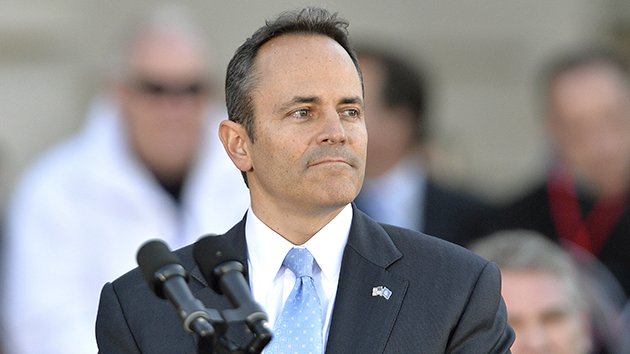
Timothy D. Easley/AP
Two weeks before leaving office, the outgoing governor of Kentucky, Democrat Steve Beshear, set up an application process to restore voting rights to the state’s ex-felons. Kentucky is one of three states today that permanently disenfranchise everyone with a felony conviction unless the governor expressly restores the right to vote, a system that disproportionately affects African Americans. The most recent data shows that 5.5 percent of Kentucky’s voting-age population is disenfranchised due to a past conviction—but for African Americans, the number is 16.7 percent.
Beshear’s announcement was expected to give 140,000 disenfranchised ex-felons in Kentucky the right to vote. But only a small number of them were able to take advantage of the new system before Beshear’s successor, Republican Matt Bevin, undid it.
Last week, just before Christmas, the governor issued a series of executive orders scrapping the work of his predecessor, including the restoration of ex-felon voting rights. Bevin’s stated reason for undoing the executive order was that the former governor did not have the authority to change the rules. “While I have been a vocal supporter of the restoration of rights, for example, it is an issue that must be addressed through the legislature and by the will of the people,” said Bevin, a tea party favorite. That’s an unusual interpretation of the state constitution, which gives the executive sole power to restore voting rights without any restrictions on how it is done.
The Bevin administration is not shy about claiming executive authority on other matters. On the same day that he ended Beshear’s streamlined process for restoring ex-felons’ rights, he also ended the requirement that marriage licenses bear the name of the presiding county clerk—a concession to Kim Davis, the Kentucky county clerk who refused to sign marriage licenses for same-sex couples.
“The requirement that the county clerk’s name appear on marriage licenses is prescribed by Kentucky law and is not subject to unilateral change by the governor,” William Sharp, a lawyer at the American Civil Liberties Union of Kentucky, said last week in response to Bevin’s order. “Today, however, a new administration claims to have that authority.”












